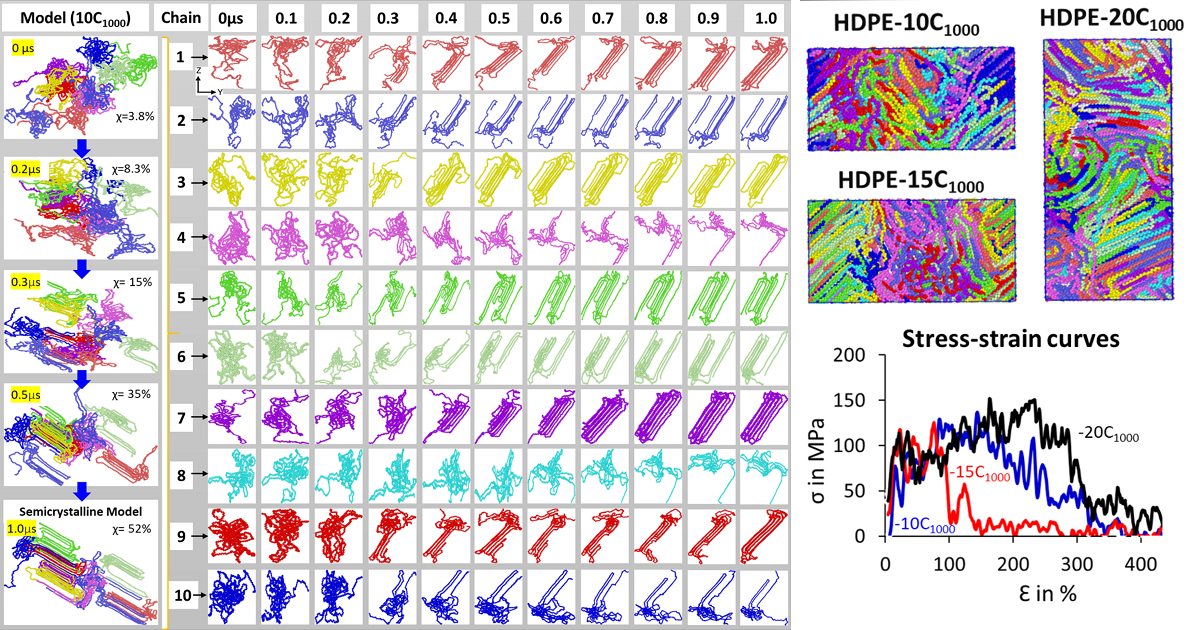- 4.9Impact Factor
- 9.7CiteScore
- 15 daysTime to First Decision
Advancing Polymer Science: Molecular Dynamics Simulations and Sustainable Recycling Innovations
This special issue belongs to the section “Polymer Physics and Theory“.
Special Issue Information
Dear Colleagues,
The sustainable recycling of polymers has become urgent. Molecular dynamics (MD) simulations are indispensable in predicting polymer behavior and can facilitate the design of environmentally friendly materials and optimize recycling processes. MD simulations have been utilized in addressing several contemporary issues in polymer sciences and have assisted in justifying the hypothesis of experimentation. The articles included in this issue will highlight the crucial role of molecular dynamics simulations in advancing sustainable polymer recycling practices. This Special Issue focuses on the intersection of polymer science, molecular dynamics simulations, and sustainable recycling methods. These reviews emphasize the potential of MD simulations to drive innovation and propel the polymer industry toward a more sustainable future. Topics will include, but are not limited to, the following:
- Polymer recycling and sustainable polymers;
- Circular economy;
- Molecular dynamics simulations, and physical, chemical, and mechanical properties;
- Polymer rheology and relaxation;
- Polymer crystallization and structure–property relationship;
- Polymer physical degradation, deterioration, and regeneration;
- Composite polymers and sustainability;
- Biopolymers and recycling strategies.
Prof. Dr. Shigeru Yao
Dr. Mohammed Althaf Hussain
Guest Editors
Manuscript Submission Information
Manuscripts should be submitted online at www.mdpi.com by registering and logging in to this website. Once you are registered, click here to go to the submission form. Manuscripts can be submitted until the deadline. All submissions that pass pre-check are peer-reviewed. Accepted papers will be published continuously in the journal (as soon as accepted) and will be listed together on the special issue website. Research articles, review articles as well as short communications are invited. For planned papers, a title and short abstract (about 250 words) can be sent to the Editorial Office for assessment.
Submitted manuscripts should not have been published previously, nor be under consideration for publication elsewhere (except conference proceedings papers). All manuscripts are thoroughly refereed through a single-blind peer-review process. A guide for authors and other relevant information for submission of manuscripts is available on the Instructions for Authors page. Polymers is an international peer-reviewed open access semimonthly journal published by MDPI.
Please visit the Instructions for Authors page before submitting a manuscript. The Article Processing Charge (APC) for publication in this open access journal is 2700 CHF (Swiss Francs). Submitted papers should be well formatted and use good English. Authors may use MDPI's English editing service prior to publication or during author revisions.
Keywords
- molecular dynamics simulations
- non-equilibrium molecular dynamics simulations
- polymer rheology
- relaxation
- polymer crystallization
- sustainable polymers
- mechanical behavior
- polymer degradation or deterioration.

Benefits of Publishing in a Special Issue
- Ease of navigation: Grouping papers by topic helps scholars navigate broad scope journals more efficiently.
- Greater discoverability: Special Issues support the reach and impact of scientific research. Articles in Special Issues are more discoverable and cited more frequently.
- Expansion of research network: Special Issues facilitate connections among authors, fostering scientific collaborations.
- External promotion: Articles in Special Issues are often promoted through the journal's social media, increasing their visibility.
- e-Book format: Special Issues with more than 10 articles can be published as dedicated e-books, ensuring wide and rapid dissemination.

